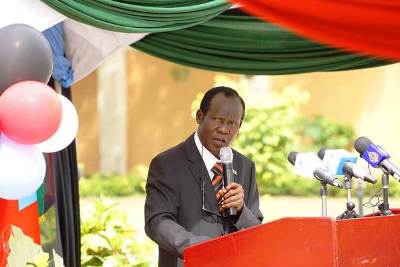South Sudan split over interim administration without rival leaders
May 16, 2014 (JUBA) – South Sudan government and its people are sharply divided on whether the proposed interim administration should include the incumbent leader, Salva Kiir and the country’s former vice president-turned rebel leader, Riek Machar.

“There will be no formation of any government in South Sudan without the participation of President Salva Kiir”, Igga told a function predominantly attended by supporters and senior members of the governing Sudan People’s Liberation Movement (SPLM).
The vice president was speaking during an occasion annually held to honour martyrs of the past civil war, which only ended after the 2005 Comprehensive Peace Agreement (CPA) was signed with Sudan prior to South Sudan’s secession in 2011.
Information minister Michael Makuei Lueth equally opposed formation of a new administration without Kiir, insisting the incumbent leader should head the interim government.
“There are those who are saying let Salva Kiir and Riek Machar go. This is something out of question unless we decide to throw away democracy”, Lueth separately told reporters on Friday.
May 16 is celebrated in South Sudan as it was the day in 1983 when the former rebel movement, the Sudan People’s Liberation Movement (SPLM) was formed under the leadership of John Garang de Mabior, as its founding leader.
It was a day when the mutinying soldiers under the command of Kerubino Kuanyin Bol, then a major in the Sudanese army, rebelled against the central government in Khartoum, marking the beginning of the second rebellion.
Stationed in the current Jonglei state capital, Bor, Bol, in an apparently coordinated act, was joined by William Nyuon Beny, another Sudanese major leading government forces in Ayod and the surrounding areas at the time. Both Bol and Beny later died mysteriously at different times and locations after running into differences with late Garang, but are continuously remembered alongside others as martyrs of freedom.
Both Igga and minister Lueth’s remarks appear a direct response to a recent proposal made by Ebony Centre for Strategic Studies, a Juba-based think tank run by the development policy forum, on how the interim administration could look like.
The draft policy paper, also obtained by Sudan Tribune, provides an analysis focusing on 12 specific objectives and functions of the interim administration. It proposed collegial and rotational presidency and 21 different cabinet positions.
MIXED REACTIONS
Lual Achuek Deng, former minister of petroleum in the Sudanese government of national unity said there was need for radical reforms in public institutions.
Deng, who is currently the managing director of Ebony Centre for Strategic Studies said it was high time president Kiir took bold decision to fight corruption.
“The current situation in South Sudan requires president Kiir to be very decisive by placing fighting rent diverting behavior on the top of his economic reform agenda. The policy of appeasement on rent seeking or diverting and corruption has been costly, and must therefore be abandoned”, he remarked.
Deng explained that the role of the proposed interim administration would be two fold: provide services to the people during the interim period and carrying out institutional reforms and the conduct of the national census while creating an environment suitable for elections.
But Deng Peter Ajak, a native of Jonglei, pointed out it was time for the people of South Sudan to honestly thank president Kiir for the period he served the country and ask him to retire from politics and go home to rest.
“It is time for us to be honest and say the truth. President Salva Kiir has served the country and we have seen how he performed. He should simply be told to go home and rest. The country has tried him and it is time we try another person”, Ajak told Sudan Tribune as he left the crowd gathered to commemorate the SPLA’s day.
Wilson Kur Deng, a native of Unity state, said South Sudan was bigger than the interest of the rival leaders who have allegedly continued to allow people die simply because none of them wants to leave power or abandon presidential ambitions.
“I feel ashamed when I see our people dying because of only two people, and find myself asking whether these people really value the lives of our people. If I were President Salva Kiir, knowing that I was elected by the people, I would have asked their opinions in a referendum to assess whether they still need me to serve them or not, or else I would have resigned, because this country is above individual ambition”, Deng suggested.
“I propose that it would be best for President Salva Kiir and Dr. Riek Machar to waive their right to participate in the upcoming interim government. Instead, they should negotiate the deal, including the work plan, budget, but task another leader within the SPLM/A to execute the deal”, said another official who preferred anonymous.
(ST)
